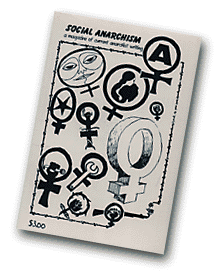Anarchists [a play]
December 27, 2005
Anarchists by S. Colman.
Detroit, Michigan: Dawn Press, 1986. $8.95 paper. (PO Box 02936, Detroit MI 48202).
Detroit, Michigan: Dawn Press, 1986. $8.95 paper. (PO Box 02936, Detroit MI 48202).
The two main characters of Anarchists, written in the early 1970s by the Detroit playwright, S. Colman, adumbrate economic trends now obvious. Ryan Lamar, an intellectual denied academic status for some of the usual reasons, is forced into the marginal economy as an underemployed operator of a driving school. Francine Vassello, a policewoman, is a liberated female in a formerly exclusive male profession who chafes under the unchanging organizational restrictions of state and society. Lamar and Vassello are brought together by a series of unsolved murders of women, murders for which Lamar becomes the prime suspect. The climax of the play finds the two discovering that beyond mere physical attraction, they share a common bond. Abandoning her job and associate, police lieutenant Audrey Scott, Vassello casts her lot with the intellectual Lamar, who offers her both freedom and affection. In so acting, Vassello also appears to cut her ties to her collegial superior, Lieutenant Scott. Although friends, a subtle class antagonism has developed between the two women, giving rise to feelings of alienation. Complicating the relationship is an unstated undercurrent of lesbianism. Whatever the case, the relationship, already under strain from differences in rank and authority, does not survive Vassello's discovery of a soulmate in the person of the anarchist Lamar.
With the proper direction and elaboration, this drama could take its place in the thriller genre, a category much abused by the entertainment industry with its endless and stupefying productions. Colman associates his work with the "theater of ideas,'' and it is these, not neurosis, that animate his dramas. Their strong social-moral fabric effectively sets them apart from contemporary American theater. In Anarchists we are reminded of the danger of jumping to conclusions, especially in situations colored by racism and sexism.
The appendix of Anarchists contains an essay entitled "John Dewey and Beyond.'' Colman compares Dewey to Thoreau (invidiously) and other thinkers, exposing the limitations of Dewey's thought, including his reliance upon bourgeois democracy. Referring to Dewey, Colman complains, "We climb one mountain (Dewey as guide) only to arrive at another" (p. 61). Nevertheless, Colman finds elements of anarchism in Dewey's writings, suggesting that for the obscure vision of a better future personified by Thoreau, one must stand on Dewey's shoulders.
With the proper direction and elaboration, this drama could take its place in the thriller genre, a category much abused by the entertainment industry with its endless and stupefying productions. Colman associates his work with the "theater of ideas,'' and it is these, not neurosis, that animate his dramas. Their strong social-moral fabric effectively sets them apart from contemporary American theater. In Anarchists we are reminded of the danger of jumping to conclusions, especially in situations colored by racism and sexism.
The appendix of Anarchists contains an essay entitled "John Dewey and Beyond.'' Colman compares Dewey to Thoreau (invidiously) and other thinkers, exposing the limitations of Dewey's thought, including his reliance upon bourgeois democracy. Referring to Dewey, Colman complains, "We climb one mountain (Dewey as guide) only to arrive at another" (p. 61). Nevertheless, Colman finds elements of anarchism in Dewey's writings, suggesting that for the obscure vision of a better future personified by Thoreau, one must stand on Dewey's shoulders.

